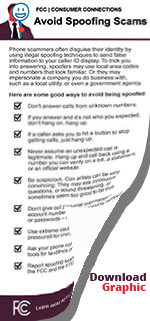View a FraudWatch video from the Federal Trade Commission on preventing IRS scams. Also, read the latest FTC Imposter Scams article: Those (not really) IRS calls
IRS Dirty Dozen Tax Scams
The IRS recently kicked off its annual "dirty dozen" list of tax scams, with a focus on phishing scams, including those using fake text messages that claim to be from the agency. This type of scam is known as smishing. To learn more about smishing scams, read the FCC's Consumer Help Center Post.
More FCC Consumer Info
It's that time of year again – when clocks spring forward, the weather warms, and tax scam phone calls proliferate like garden weeds.
While scammers know no season, the Internal Revenue Service does. You may be focused on gathering receipts for itemized deductions, just as bad actors may be turning their attention to impersonating IRS agents. In doing so, they use technology known as spoofing to make your phone's caller ID display a number that looks like it's from the IRS to try to trick you into answering.
To avoid being scammed, it is useful to know what the IRS does and does not do.
On its webpage, the IRS provides information on how to know if it's really them calling. The first thing to know is that the IRS initiates most contacts through regular mail delivered by the U.S. Postal Service. If you're called by someone claiming to be from the IRS, you should be on guard, especially if you have not received prior written notice in the mail.
The IRS also does not:
- Call to demand immediate payment using a specific payment method such as a prepaid debit card, gift card or wire transfer. Generally, the IRS will first mail you a bill if you owe any taxes.
- Threaten to immediately bring in local police or other law enforcement groups to have you charged or arrested for not paying.
- Demand that you pay taxes without giving you the opportunity to question or appeal the amount they say you owe.
- Ask for credit, debit, or gift card numbers over the phone.
The IRS provides specific guidelines on how you can make a tax payment at irs.gov/payments.
Do not give out any of your personal information over the phone. If you receive a call from someone claiming to be from the IRS, remember:
- If you do not owe taxes and never received a bill in the mail prior to the call, hang up immediately. Then call the Treasury Inspector General for Tax Administration to report the incident at 1-800-366-4484. If possible, report the phone number used in the suspicious call.
- If you think you owe taxes, hang up and call the IRS on their official number at 1-800-829-1040 to validate the call. If there is a valid tax issue, IRS employees at this number will assist you.
Spoofed calls impersonating federal agencies are nothing new. The FCC receives consumer complaints about fake IRS calls year-round, though the number of complaints generally increases during tax season.
The FCC offers helpful tips to avoid spoofing scams and robocalls, along with Consumer Help Center posts about recent scams such as this one.
If you think that you are a victim of fraud related to a robocall or caller ID spoofing, contact law enforcement to report the scam. You can also file a complaint with the FCC at no cost. Read the FCC Complaint Center FAQ to learn more about the FCC's informal complaint process, including how to file a complaint, and what happens after a complaint is filed. You can also file complaints with the FTC about consumer fraud, including fraud resulting from spoofed phone calls.
Alternate Format Requests
People with print disabilities may request braille, large print, or screen-reader friendly versions of this article via the email form at fcc504@fcc.gov. For audio and other access, use the "Explore Accessibility Options" link.
Consumer Help Center
Learn about consumer issues - visit the FCC's Consumer Help Center at fcc.gov/consumers.
File a Complaint with the FCC
Visit our Consumer Complaint Center at consumercomplaints.fcc.gov to file a complaint or tell us your story.
